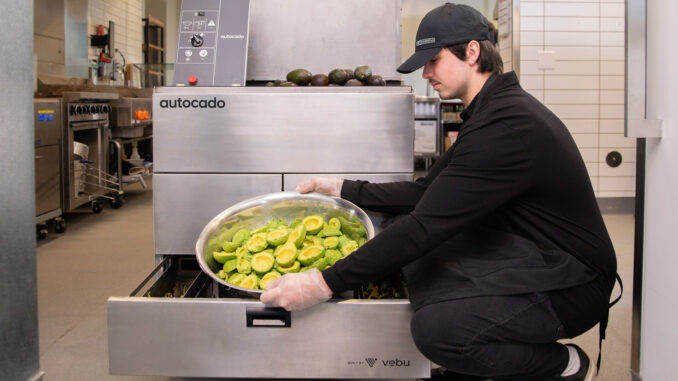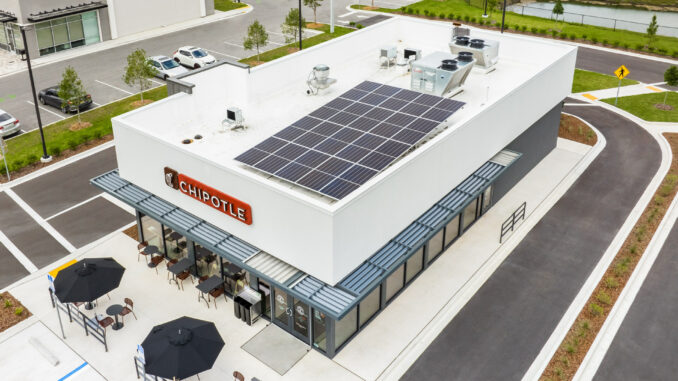
By Lea Mira, RTN staff writer - 7.19.2023
Chipotle Mexican Grill has unveiled its latest innovation in restaurant technology with the introduction of Autocado, an avocado processing cobotic prototype. Developed in collaboration with restaurant technology solution provider Vebu, Autocado is a collaborative robot that performs the tasks of cutting, coring, and peeling avocados, which are then hand mashed to create Chipotle’s renowned guacamole. Currently undergoing testing at the Chipotle Cultivate Center in Irvine, California, Autocado has the potential to fully automate the guacamole preparation process, enhancing efficiency and reducing labor time.
The Autocado prototype aims to streamline the avocado preparation process and significantly reduce guacamole prep time, potentially by 50 percent. By automating the cutting, coring, and peeling of avocados, Chipotle employees will have more time to focus on serving guests and providing exceptional hospitality. The device can hold up to 25 lbs. of avocados at once and operates by orienting the avocados vertically and transferring them to the processing device for slicing in half. The Autocado then automatically removes the cores and skins, collecting the fruit in a stainless-steel bowl, which is later used by employees to add ingredients and hand mash the avocados into Chipotle’s signature guacamole.
The collaboration between Chipotle and Vebu for the development of Autocado originated from the need to enhance efficiency in Chipotle’s avocado preparation process. By analyzing the company’s existing methods and identifying time-consuming tasks, the teams worked together to create an innovative solution that streamlines operations while maintaining Chipotle’s culinary standards. Currently, it takes approximately 50 minutes to make a batch of guacamole, including the labor-intensive tasks of cutting, coring, and scooping avocados.
The potential impact of Autocado extends beyond time savings. By increasing the precision and efficiency of avocado processing, the device aims to boost avocado fruit yield, aligning with Chipotle’s sustainability initiatives and waste reduction efforts. As Chipotle utilizes over 100 million pounds of avocados across its restaurants in the United States, Canada, and Europe each year, the potential cost savings from increased yield could be significant. Additionally, Chipotle’s investment in Vebu is part of its Cultivate Next venture fund, which focuses on making early-stage investments in companies aligned with Chipotle’s mission to create a better world and support its growth plans.

Looking ahead, Vebu is working on improving Autocado’s processing speeds through ongoing development and refinement. The goal is to leverage artificial intelligence and machine learning technologies in future iterations of Autocado, enabling the device to evaluate avocado quality and optimize the cutting, coring, and peeling processes. This integration of AI and machine learning has the potential to further enhance efficiency and waste reduction while maintaining the high standards of Chipotle’s guacamole preparation.
Autocado joins Chipotle’s other technology-driven initiatives, including the testing of Chippy, an autonomous kitchen assistant for making tortilla chips, and the implementation of a kitchen management system that utilizes machine learning to optimize ingredient freshness and minimize food waste. The system analyzes real data as well as food operations simulation data to create algorithms designed to optimize performance and “accelerate deployment of intelligent devices.” The technology also reduces overhead costs and food waste by allowing restaurants to more accurately predict demand at any given time. Early results indicate the Chipotle pilot is effectively streamlining kitchen operations. These efforts, coupled with Chipotle’s commitment to energy efficiency and renewable resources, demonstrate the company’s dedication to enhancing operations and improving sustainability.
Chipotle had over 3,200 restaurants as of March 31, 2023, in the United States, Canada, the United Kingdom, France and Germany. As the company continues its expansion plans, aiming to reach 7,000 locations in North America, technology-driven innovations like Autocado and Chippy will play a crucial role in enhancing efficiency and scaling the company’s impact.

